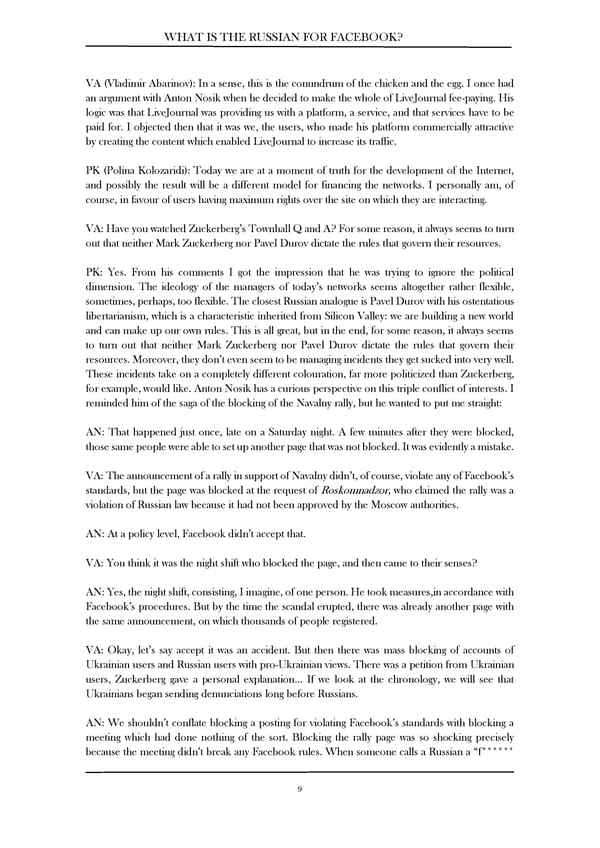WHAT IS THE RUSSIAN FOR FACEBOOK? VA (Vladimir Abarinov): In a sense, this is the conundrum of the chicken and the egg. I once had an argument with Anton Nosik when he decided to make the whole of LiveJournal fee-paying. His logic was that LiveJournal was providing us with a platform, a service, and that services have to be paid for. I objected then that it was we, the users, who made his platform commercially attractive by creating the content which enabled LiveJournal to increase its traffic. PK (Polina Kolozaridi): Today we are at a moment of truth for the development of the Internet, and possibly the result will be a different model for financing the networks. I personally am, of course, in favour of users having maximum rights over the site on which they are interacting. VA: Have you watched Zuckerberg’s Townhall Q and A? For some reason, it always seems to turn out that neither Mark Zuckerberg nor Pavel Durov dictate the rules that govern their resources. PK: Yes. From his comments I got the impression that he was trying to ignore the political dimension. The ideology of the managers of today’s networks seems altogether rather flexible, sometimes, perhaps, too flexible. The closest Russian analogue is Pavel Durov with his ostentatious libertarianism, which is a characteristic inherited from Silicon Valley: we are building a new world and can make up our own rules. This is all great, but in the end, for some reason, it always seems to turn out that neither Mark Zuckerberg nor Pavel Durov dictate the rules that govern their resources. Moreover, they don’t even seem to be managing incidents they get sucked into very well. These incidents take on a completely different colouration, far more politicized than Zuckerberg, for example, would like. Anton Nosik has a curious perspective on this triple conflict of interests. I reminded him of the saga of the blocking of the Navalny rally, but he wanted to put me straight: AN: That happened just once, late on a Saturday night. A few minutes after they were blocked, those same people were able to set up another page that was not blocked. It was evidently a mistake. VA: The announcement of a rally in support of Navalny didn’t, of course, violate any of Facebook’s standards, but the page was blocked at the request of Roskomnadzor, who claimed the rally was a violation of Russian law because it had not been approved by the Moscow authorities. AN: At a policy level, Facebook didn’t accept that. VA: You think it was the night shift who blocked the page, and then came to their senses? AN: Yes, the night shift, consisting, I imagine, of one person. He took measures,in accordance with Facebook’s procedures. But by the time the scandal erupted, there was already another page with the same announcement, on which thousands of people registered. VA: Okay, let’s say accept it was an accident. But then there was mass blocking of accounts of Ukrainian users and Russian users with pro-Ukrainian views. There was a petition from Ukrainian users, Zuckerberg gave a personal explanation... If we look at the chronology, we will see that Ukrainians began sending denunciations long before Russians. AN: We shouldn’t conflate blocking a posting for violating Facebook’s standards with blocking a meeting which had done nothing of the sort. Blocking the rally page was so shocking precisely because the meeting didn’t break any Facebook rules. When someone calls a Russian a “f****** 9
 What is the Russian for Facebook? Page 9 Page 11
What is the Russian for Facebook? Page 9 Page 11